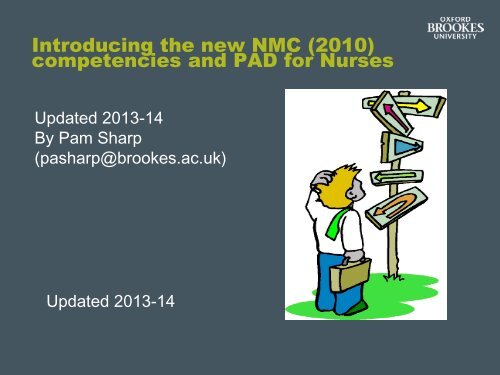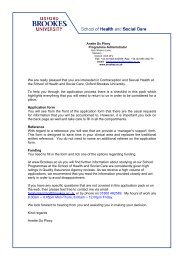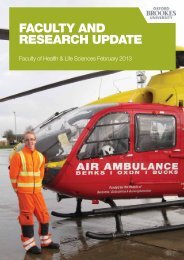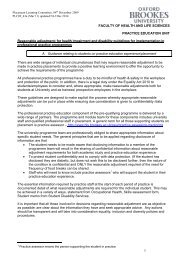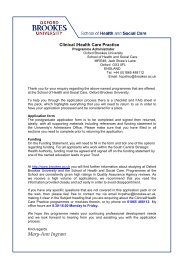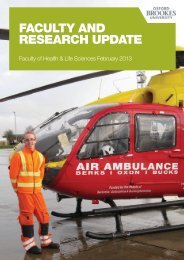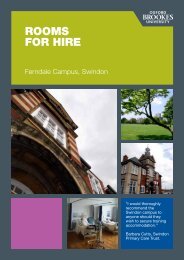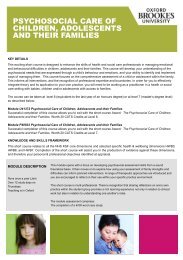Introducing the New NMC comptencies and PAD for nurses
Introducing the New NMC comptencies and PAD for nurses
Introducing the New NMC comptencies and PAD for nurses
You also want an ePaper? Increase the reach of your titles
YUMPU automatically turns print PDFs into web optimized ePapers that Google loves.
<strong>Introducing</strong> <strong>the</strong> new <strong>NMC</strong> (2010)<br />
competencies <strong>and</strong> <strong>PAD</strong> <strong>for</strong> Nurses<br />
Updated 2013-14<br />
By Pam Sharp<br />
(pasharp@brookes.ac.uk)<br />
Updated 2013-14
Aims of <strong>the</strong> session:<br />
• To identify <strong>the</strong>y key changes to pre-registration nursing<br />
competencies<br />
• To review <strong>the</strong> key roles of mentoring within <strong>the</strong> new<br />
associated paperwork<br />
• To identify support mechanisms <strong>and</strong> importance of<br />
keeping evidence of your CPD as a mentor<br />
• To explain changes to <strong>the</strong> ‘Facilitating Workplace Learning’<br />
course - <strong>for</strong> existing mentors who may be asked to be a<br />
practice assessor/observer <strong>for</strong> course members
Requirements:<br />
• As a mentor or sign off mentor you are REQUIRED by<br />
<strong>the</strong> <strong>NMC</strong> (2008) St<strong>and</strong>ard to support learning <strong>and</strong><br />
assessment in practice (SLAiP) to update every year<br />
see http://www.nmc-uk.org/Publications/St<strong>and</strong>ards/<br />
You are also required to:<br />
• Complete a triennial review of your mentoring role<br />
See http://www.hls.brookes.ac.uk/peu/nmc-st<strong>and</strong>ards<br />
<strong>for</strong> resources you can use such as self assessment <strong>and</strong><br />
mentor profile <strong>and</strong> portfolio of evidence
To access <strong>the</strong> student’s Practice<br />
Assessment Documents go to <strong>the</strong><br />
relevant web pages:<br />
• For Adult Nursing: https://shscint.brookes.ac.uk/documents/browse.php?fFolderId=731<br />
• you can select post Sept 12<br />
• For Adult/Mental Health https://shscint.brookes.ac.uk/documents/browse.php?fFolderId=803<br />
• For Child branch https://shscint.brookes.ac.uk/documents/browse.php?fFolderId=744<br />
• For Child/Mental Health https://shscint.brookes.ac.uk/documents/browse.php?fFolderId=802<br />
• For Mental Health https://shscint.brookes.ac.uk/documents/browse.php?fFolderId=74
St<strong>and</strong>ards <strong>for</strong> Pre-registration<br />
Nursing Education (<strong>NMC</strong> 2010)<br />
• Updated to ensure relevant to today’s practice (old ones<br />
were dated 2004)<br />
• Nurses from across <strong>the</strong> country including Brookes <strong>and</strong><br />
local trusts were involved in developing <strong>the</strong> st<strong>and</strong>ards<br />
• All pre registration nursing courses revalidated to check<br />
<strong>the</strong>y meet <strong>the</strong> new st<strong>and</strong>ards<br />
• Keeping 2300 hours of practice (50%)<br />
• These st<strong>and</strong>ards <strong>and</strong> competencies are adopted by all<br />
nursing students who started <strong>the</strong> program on or after Sept<br />
2012
Changes in emphasis in <strong>the</strong> new<br />
st<strong>and</strong>ards<br />
• All fields need to meet <strong>the</strong> essential needs <strong>for</strong> all client<br />
groups <strong>and</strong> manage complex needs within own field<br />
• Leadership skills e.g. delegating, planning, decision making,<br />
using evidence are emphasised<br />
• Emphasis on developing independence <strong>and</strong> autonomy as a<br />
practitioner (required by end of year two)<br />
• Safeguarding vulnerable groups is added<br />
• Essential skills are all included 42 statements (e.g. privacy<br />
<strong>and</strong> dignity)
Main Changes in <strong>the</strong> documentation<br />
Placement leads from Children's, Mental Health <strong>and</strong> Adult<br />
talked to students <strong>and</strong> mentors to develop <strong>the</strong> draft (we no<br />
longer take new Learning Disability students at OBU).<br />
•Competencies completely rewritten to avoid repetition <strong>and</strong><br />
woolliness<br />
•Removed reflection on individual competencies in <strong>the</strong> little<br />
boxes<br />
•Formative feedback to be written as part of midway review<br />
not on specific comps (relating to each of <strong>the</strong> 4 domains)<br />
•Reduce number of times mentor has to sign each comp<br />
•Increase meaningful reflection <strong>and</strong> use this as evidence of<br />
competency<br />
•Put in l<strong>and</strong>scape <strong>for</strong>mat
<strong>New</strong> practice documentation:<br />
2 parts (Practice Education H<strong>and</strong>book (PEH) <strong>and</strong><br />
Practice Assessment Document (<strong>PAD</strong>)<br />
Practice Education H<strong>and</strong>book (PEH) reference<br />
document – how practice is organised <strong>and</strong> regulated<br />
1.Practice education requirements<br />
2.Structure <strong>and</strong> content of practice<br />
3.Organisation of practice experience<br />
4.Roles <strong>and</strong> responsibilities
Practice assessment document<br />
(<strong>PAD</strong>)<br />
Working document used to plan <strong>and</strong> record learning<br />
<strong>and</strong> competence in practice. The sections are:<br />
1. How to use <strong>the</strong> document<br />
2. Practice learning <strong>and</strong> assessment learning record<br />
(<strong>for</strong>ms)<br />
3. Competency framework<br />
4. Simulated practice learning (SPL)
<strong>New</strong> <strong>NMC</strong> (2010) St<strong>and</strong>ards <strong>for</strong><br />
pre-registration nurse education<br />
• St<strong>and</strong>ards <strong>for</strong> student nurse competency organised into<br />
4 domains:<br />
• Professional values,<br />
• Communication <strong>and</strong> interpersonal skills,<br />
• Nursing practice <strong>and</strong> decision making,<br />
• Leadership, management <strong>and</strong> team working<br />
http://st<strong>and</strong>ards.nmcuk.org/PublishedDocuments/St<strong>and</strong>ards%20<strong>for</strong>%20preregistration%20nursing%20education%2016082010.pdf<br />
• These will be used by our students from Sept 2012
Mentoring a student from <strong>the</strong> initial<br />
placement meeting to <strong>the</strong> final<br />
placement meeting<br />
See initial placement interview <strong>for</strong>m<br />
•See section 1 explanation of initial placement<br />
meeting<br />
Discuss importance of completing this <strong>for</strong>m/initial<br />
placement meeting<br />
•Previous achievements – students should complete<br />
be<strong>for</strong>e <strong>the</strong>y arrive on placement<br />
•Compete initial checks <strong>and</strong> discussion record<br />
Ensure you underst<strong>and</strong> each check point
Objective setting<br />
• <strong>New</strong> <strong>for</strong>mat –<br />
• Importance of clear objective setting <strong>for</strong> assessing<br />
practice <strong>and</strong> planning learning<br />
• See explanation of SMART in section 1 (how to write<br />
objectives)<br />
• See website below <strong>for</strong> ideas of words to use<br />
• http://www.businessballs.com/bloomstaxonomyoflearn<br />
ingdomains.htm
Competency assessment: You need<br />
to plan how you will assess your<br />
student<br />
• Read <strong>the</strong> guidance in section 1 on mentor feedback in midway<br />
<strong>and</strong> final feedback<br />
• Read <strong>the</strong> words of <strong>the</strong> competency – it will indicate <strong>the</strong> actions<br />
that <strong>the</strong> student has to do to demonstrate competency e.g.<br />
identify, recognise, accurately monitor etc.<br />
• Consider <strong>the</strong> evidence (what have you seen, read, talked<br />
about). Students must show you written reflections on <strong>the</strong>ir<br />
practice identifying relevant competencies<br />
• Use of o<strong>the</strong>rs: client feedback, o<strong>the</strong>r colleagues, wider<br />
professional team (see <strong>for</strong>m: feedback from o<strong>the</strong>rs who have<br />
contributed to this assessment)
Activity:<br />
Write an objective that reflects a learning opportunity in<br />
your placement area using <strong>the</strong> framework given<br />
Hints:<br />
•Use words that involve <strong>the</strong> student doing something e.g.<br />
discuss, demonstrate, describe, identify, plan etc.<br />
•Consider <strong>the</strong> stage of <strong>the</strong> students learning e.g. move<br />
from describe <strong>for</strong> a 1 st year, discuss <strong>for</strong> a 2 nd or 3 rd year.<br />
Remember: more objectives can be added later as<br />
student becomes familiar with opportunities
Midway review of progress<br />
Read guidance on midway review of progress in section 1<br />
<strong>and</strong> tips <strong>for</strong> mentors on giving <strong>and</strong> final written feedback<br />
section 1<br />
Purposes of meeting<br />
• Discuss students progress in relation to objectives <strong>and</strong><br />
comps<br />
• To give feedback regarding per<strong>for</strong>mances including<br />
strengths <strong>and</strong> areas <strong>for</strong> development<br />
• To agree an revised action plan that will help student<br />
achieved competences required by deadline<br />
• Consider involvement of link lecturer (not just when <strong>the</strong>re<br />
are problems)
Final assessment of practice<br />
Read section on mentor final assessment in section 1<br />
Read an example final feedback <strong>and</strong> consider writing your<br />
own <strong>for</strong> a student you have mentored<br />
Check<br />
• Is it specific about how often, how well <strong>and</strong> how <strong>the</strong><br />
student per<strong>for</strong>med<br />
• Does it identify strengths <strong>and</strong> areas <strong>for</strong> development<br />
• Does it discuss knowledge as well as skill
Assessment should be:<br />
Reliable – would all assessors using <strong>the</strong> same criteria<br />
come to <strong>the</strong> same judgement<br />
Valid – do we actually assess what we want to assess?<br />
(<strong>and</strong> are we explicit about it?)<br />
Relevant – are we assessing things we want <strong>the</strong><br />
students to demonstrate? (i.e. why are we assessing<br />
this, is it important?)<br />
Rust C (2002) Purposes <strong>and</strong> principles of assessment<br />
http://www.brookes.ac.uk/services/ocsld/resources/briefing_papers/p_p_as<br />
sessment.pdf accessed 5/7/13
Assessment continued…<br />
Ask <strong>the</strong>m what we teach <strong>the</strong>m! (give notice), ask students to<br />
bring in lecture notes, ask students to show you skills books/<br />
videos (e.g. clinicalskills.net)<br />
Get <strong>the</strong>m to demonstrate a skill with commentary about<br />
rationale/evidence “I’m now doing… because…”<br />
Give <strong>the</strong>m advance notice to prepare: Tomorrow we will<br />
discuss…find out all you can about…?, Look up all <strong>the</strong> drugs<br />
on <strong>the</strong>se 3 patients be<strong>for</strong>e we administer <strong>the</strong> medications<br />
Reflective discussions i.e. “tell me about…” or “what<br />
happened?”
Assessment continued…<br />
• Discuss what is observed or heard as evidence ra<strong>the</strong>r<br />
than generalisations.<br />
• Get students to present cases of patient/clients (do a<br />
h<strong>and</strong>over with rationale) to you to assess knowledge<br />
<strong>and</strong> attitude.<br />
• Ask more in depth questions about <strong>the</strong> knowledge part<br />
of competencies e.g. why is it important?, what are your<br />
priorities? Get to see <strong>the</strong>ir thinking!<br />
• Get <strong>the</strong>m to tell you what <strong>the</strong>y have learnt each shift<br />
(not just what <strong>the</strong>y have done!)
Assessment continued…<br />
•Get students to summarise what <strong>the</strong>y have learnt in<br />
university about a topic (use SPL sheets as a trigger or<br />
competency statements). If <strong>the</strong>y say <strong>the</strong>y haven’t done it,<br />
ask your link lecturer<br />
•Consider if you like <strong>the</strong> student <strong>and</strong> how that influences<br />
your assessment of <strong>the</strong>m (are you kinder to nice students!<br />
or harder on students you don’t click with?).<br />
•Discuss what students learn from role modelling your<br />
practice (ask <strong>for</strong> critical comment <strong>and</strong> feedback)<br />
•Get more feedback from patients/clients <strong>and</strong> colleagues
Failing to fail<br />
• It is <strong>the</strong> student’s responsibility to provide evidence of<br />
competency- if <strong>the</strong>y do not <strong>the</strong>n <strong>the</strong>y cannot pass<br />
• It is not you who fails <strong>the</strong>m - it is <strong>the</strong>y that fail to<br />
demonstrate that <strong>the</strong>y meet <strong>the</strong> criteria<br />
• You are accountable <strong>for</strong> your actions. Don’t sign if<br />
you don’t think <strong>the</strong>y are competent.<br />
• Don’t take personal/health issues into account when<br />
you assess competency
Failing to fail (continued…)<br />
• Seek support of more experienced peers/Link<br />
Lecturer<br />
• Encourage <strong>the</strong> student to set new SMART goals <strong>for</strong><br />
<strong>the</strong> area that is not yet demonstrated (i.e. what do<br />
<strong>the</strong>y need to do to achieve <strong>the</strong> expected level of<br />
competency)<br />
• Avoid discussing problems with o<strong>the</strong>r people if you<br />
have not discussed <strong>the</strong>m constructively with <strong>the</strong><br />
student.<br />
• Keep <strong>the</strong> professional behaviour competency (1b)<br />
unsigned until <strong>the</strong> final day.
Finding in<strong>for</strong>mation/ support<br />
• Ensure you know who your Link Lecturer is <strong>and</strong> that<br />
<strong>the</strong>y know how to contact you<br />
• Identify any educational link <strong>nurses</strong>/PDNs or LELs or<br />
experienced SOMs in your area<br />
• Use <strong>the</strong> Practice Education Unit (PEU) website to<br />
access policy/guidelines<br />
http://www.hls.brookes.ac.uk/peu<br />
• Ask <strong>for</strong> support if you need it
Keeping evidence/CPD<br />
• See h<strong>and</strong>-out <strong>for</strong> mentor profile <strong>and</strong> portfolio of<br />
evidence http://www.hls.brookes.ac.uk/peu/nmcst<strong>and</strong>ards<br />
• Keep records of numbers <strong>and</strong> <strong>the</strong> year of your<br />
students<br />
• Keep any feedback, reflections, self-assessments<br />
• Remember your triennial review <strong>and</strong> self-assess<br />
against <strong>the</strong> <strong>NMC</strong> (2018) 8 domains <strong>for</strong> mentors<br />
http://www.hls.brookes.ac.uk/peu/nmc-st<strong>and</strong>ards
Facilitating workplace learning module<br />
• Recent re-approval of <strong>the</strong> course requires that we<br />
have more specific monitoring <strong>and</strong> evidence that <strong>the</strong><br />
<strong>NMC</strong> (2008) St<strong>and</strong>ard to support learning <strong>and</strong><br />
assessment (SLAiP) is being met…
Entry requirements <strong>for</strong> <strong>the</strong> module:<br />
• be a <strong>NMC</strong> registrant<br />
• have a minimum of 9 months’ post-qualifying<br />
experience <strong>and</strong> have developed <strong>the</strong>ir own knowledge,<br />
skills <strong>and</strong> competence beyond registration<br />
• be currently in practice within a health or social care<br />
setting<br />
• have access to a learner who is a <strong>NMC</strong> student on <strong>the</strong><br />
same part of <strong>the</strong> register <strong>and</strong> same field of practice<br />
• be supported in practice by a qualified mentor who<br />
has ‘due regard’ (this is an <strong>NMC</strong> term <strong>and</strong> means to be on<br />
<strong>the</strong> same part of <strong>the</strong> register <strong>and</strong> field of practice)<br />
• have 5 days protected learning time
Changes to <strong>the</strong> module continued<br />
• Manager’s supporting statement (more specific)<br />
• Learning log (to record 10 days learning in practice <strong>and</strong><br />
academic settings including 5 days protected)<br />
• Role of practice assessor (previously called observer)<br />
• Experienced, enhanced role in passing practice element ) results in technical fail if<br />
not passed be<strong>for</strong>e final deadline) ? LL support?<br />
• Evidence of meeting stage 2 of framework (Pass/refer)<br />
<strong>and</strong> <strong>for</strong> midwives SOM criteria.<br />
Revision of assessment - to move from teaching session<br />
to facilitating learning <strong>and</strong> recognition of practice learning<br />
(on going with team)<br />
Review <strong>and</strong> update taught element (to be more explicit re<br />
<strong>NMC</strong> st<strong>and</strong>ards)
Useful sources:<br />
• For setting goals see Blooms taxonomy<br />
http://www.businessballs.com/bloomstaxonomyoflearnin<br />
gdomains.htm<br />
• <strong>NMC</strong> <strong>for</strong> all st<strong>and</strong>ards <strong>and</strong> guidance http://www.nmcuk.org/<br />
Ox<strong>for</strong>d Brookes Practice Education Unit (see drop down<br />
menu on left h<strong>and</strong> side <strong>for</strong> options)<br />
http://www.hls.brookes.ac.uk/peu<br />
• Document store <strong>for</strong> <strong>for</strong>ms relating to our programmes<br />
https://shscint.brookes.ac.uk/documents/browse.php?fFolderId=59
Additional in<strong>for</strong>mation:<br />
• <strong>NMC</strong> (2010) St<strong>and</strong>ard <strong>for</strong> Pre-registration nurse education<br />
available at<br />
• http://st<strong>and</strong>ards.nmc-uk.org/Pages/Welcome.aspx accessed<br />
on 5/7/13<br />
• <strong>NMC</strong> (2008) St<strong>and</strong>ard to support learning <strong>and</strong> assessment<br />
in practice available at http://www.nmcuk.org/Educators/St<strong>and</strong>ards-<strong>for</strong>-education/St<strong>and</strong>ards-tosupport-learning-<strong>and</strong>-assessment-in-practice/<br />
accessed on<br />
5/7/13


